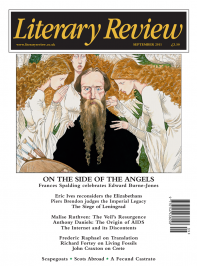Eric Ives
Not So Gloriana?
The Elizabethans
By A N Wilson
Hutchinson 432pp £25.99
At a state banquet in Dublin in May of this year, the Queen remarked: ‘With the benefit of historical hindsight we can all see things which we would wish had been done differently or not at all.’ Her speech was warmly received as a formal British admission of past mistakes and the painstaking ‘loosening’ of ‘a knot of history’. A N Wilson, too, sees the drawing of a line under the past, but argues in The Elizabethans that it is something even more. He believes that settlement in Ireland means that we can never see British – and specifically English – policy towards Ireland as we used to. He makes the same point about the slave trade. The inhumanity we now recognise must, he believes, alter the way we see the maritime exploits of Hawkins, Drake and the Elizabethan ‘sea-dogs’. According to Wilson, modern history started with the reign of Queen Elizabeth but the myth that grew up and made sense of it – nationalism, Protestantism, the Church of England, overseas exploration and expansion – no longer has any credibility. That posed the fundamental problem he faced in writing this book. How could he write about the Elizabethans without being ‘unimaginatively judgemental’? That is ‘the Difficulty’ – of which more anon.
The book is constructed in four sections, each covering a decade or so of Elizabeth’s reign, but not with a linear narrative. Wilson selects topics for consideration from each decade. Some are thematic, for example the role of ceremonial in constructing the image of the queen. Others focus

Sign Up to our newsletter
Receive free articles, highlights from the archive, news, details of prizes, and much more.@Lit_Review
Follow Literary Review on Twitter
Twitter Feed
It wasn’t until 1825 that Pepys’s diary became available for the first time. How it was eventually decrypted and published is a story of subterfuge and duplicity.
Kate Loveman tells the tale.
Kate Loveman - Publishing Pepys
Kate Loveman: Publishing Pepys
literaryreview.co.uk
Arthur Christopher Benson was a pillar of the Edwardian establishment. He was supremely well connected. As his newly published diaries reveal, he was also riotously indiscreet.
Piers Brendon compares Benson’s journals to others from the 20th century.
Piers Brendon - Land of Dopes & Tories
Piers Brendon: Land of Dopes & Tories - The Benson Diaries: Selections from the Diary of Arthur Christopher Benson by Eamon Duffy & Ronald Hyam (edd)
literaryreview.co.uk
Of the siblings Gwen and Augustus John, it is Augustus who has commanded most attention from collectors and connoisseurs.
Was he really the finer artist, asks Tanya Harrod, or is it time Gwen emerged from her brother’s shadow?
Tanya Harrod - Cut from the Same Canvas
Tanya Harrod: Cut from the Same Canvas - Artists, Siblings, Visionaries: The Lives and Loves of Gwen and Augustus John by Judith Mackrell
literaryreview.co.uk